My daughter, Eleni, is twenty-one now, but I distinctly remember a day when she was two and I was desperately trying to convince her to put on her shoes so we could go out to play. Eleni was running around distractedly and wouldn’t listen, while my mother, then seventy-five, was repeatedly asking me unrelated questions—something about a neighbor and what we would like for dinner. As I answered my mother’s questions, she asked them again because she was hard of hearing. For what seemed to be an eternity, I found myself caught in a cycle of speaking louder and louder to a two-year-old who wouldn’t listen and to a seventy-five-year-old who couldn’t hear. To a bystander, the scene may have seemed comical, but I was not amused.
In retrospect, that particular day was golden. The sun was shining, my father—also seventy-five—was out for a run, and my mother was still able to cook the foods of her native Greece. Though I was an exhausted, older single mother, I found immense joy in (eventually) taking my daughter out to play, and, as an only child, I reveled in the fact that my parents had finally been granted a grandchild. My family now felt whole and complete.
In a few years’ time, things would change.
“Ever since I was a child, I dreamed of becoming a mother; and as I crept toward forty and remained unmarried, this dream, this ambition, didn’t fade. Then when I was forty-one, a confluence of factors arose that made motherhood seem possible.”
Living in an unusually sizable apartment in Brooklyn, I had a steady job that I loved, supportive parents and friends who resided near my home, and a surprising ally in the Chinese government. Though things have changed since, there existed a window of time, a fortuitous opening, when the Chinese government allowed a single woman over forty to adopt a healthy infant—in most cases, a baby girl. (For me this was a bonus, since I intended to raise a child on my own.) On top of that, the adoption process in China was fairly straightforward; and with some luck, it appeared I could be in China within eighteen months, a new mother to a baby daughter. After much thought and reasonable trepidation, I decided to pursue this option.
On August 16, 1999, I arrived at a dimly lit registrar’s office in central China, where I was handed an eight-month-old baby. At the age of forty-two, I suddenly became a first-time mother. I named my daughter Eleni in honor of my own mother, who had waited patiently for her first and only grandchild. Then nine days later, we flew home to New York, where my parents and friends greeted us at the airport. Eleni and I were set to begin our new life together.
Our first two years in Brooklyn passed quickly. Eleni was a happy child, a curious child, a child who never slept. By extension, I was always exhausted, holding down a full-time job, caring for my daughter, having few spare moments to myself. But as an older mother, I viewed this juggling act and ever-present fatigue as a small price to pay for the joy of raising a child. As a parent over forty, I’d had countless years of “me time,” during which I could travel, see friends, build a career. So spending a Saturday afternoon with my parents and Eleni was more than enough to make me happy. Having my mother prepare Greek meals and bring them to our house, or seeing my dad play so energetically in the park with my daughter, fulfilled me. I was grateful for my job, grateful to reside in a neighborhood with other adoptive families and little girls from China, and grateful for the multicultural city in which I lived. By some divine stroke of luck, everything seemed in order.
But as it happens, the best-laid plans often go awry. On September 11, 2001, when Eleni was almost three, the World Trade Center was hit by terrorists, bringing our city to its knees. Several weeks later, the magazine at which I’d worked for nearly a decade folded, citing a consistent loss of revenue. Then, in the spring of 2004, my seventy-nine-year-old father—the bedrock of our family, a man with boundless energy—was diagnosed with mesothelioma, a rare form of lung cancer. How supremely unfair it felt that a man who had valued his health and had so much to live for would be struck with such a fatal illness. Within six months of his diagnosis, my father died, leaving me with countless business affairs to look after, a broken heart, and a mother and daughter who were beyond bereaved.
Eleni was five, almost six, when her grandpa died, so it was hard for her to comprehend how this vibrant man had left us. On the playground at school, Eleni would look up at the sky and see her grandfather’s wispy, white hair in the cloud formation above her. In class, she described his spirit as coming to her “like a wind,” helping her with her math problems. My dad was athletic, so in tribute to him, Eleni learned to play soccer and tennis. She was fast on her feet and adopted my father’s work ethic.
My mother, on the other hand, was seventy-nine when her husband died. For years, her health had been faltering, first with coronary bypass surgery in her early fifties, then later with various issues causing memory loss and pain. My mother was surprisingly strong, having survived not only these health problems but also the shelling of Athens during World War II, yet somehow, she liked to convince everyone that she was weak, a victim who needed constant care.
My father had been that primary caregiver, her rock—her lifeline to the world. When he died, my mother was understandably adrift. In order to protect her, my father had declined to tell my mother exactly how sick he was, perhaps believing he had more time to live than he did. But her lack of emotional preparedness and the relative speed of my father’s passing sent my mother into a tailspin. There were days when she stubbornly refused to take her medication and her memory loss worsened. There were times when she became short-tempered with Eleni and with me.
As the weeks passed, I tried to keep our lives in Brooklyn in balance. My daughter was in first grade now, learning to read, write, and socialize. I was working from home as a freelance writer and editor, which gave me flexibility in terms of time and workflow. But every weekend, Eleni and I would run out to my mother’s house some fifty miles away to check up on her and a family friend who’d agreed to stay temporarily. My mother was sad, lonely, and increasingly confused, and it became clear she would soon need a higher level of care. The turning point came a short while later, when my mother arrived at my apartment for an extended visit. As she bent to tie her shoelaces one day, she slipped and fell, fracturing a vertebra in her back. It was the last day my mother would walk independently. She would soon need a wheelchair.
Faced with this new set of circumstances and knowing my mother could no longer live independently, I decided to move her to Brooklyn, into a sunny assisted-care facility near my home. I hired loving professional aides to care for my mother and I visited almost daily. But although the logistics of having my mother close by made life easier, I was still wracked with guilt. I knew my mom was suffering.
For one thing, my mother wanted to go home, and home meant her house on Long Island. Because of her deepening dementia and overwhelming grief, my mother couldn’t understand why she couldn’t live alone and why my father had left her. In an effort to comfort her and settle her nerves, I brought my mother some personal belongings, including a painting she loved of me and Eleni. I also brought my six-year-old daughter to visit her whenever possible. Sometimes Eleni would draw or play contentedly, and sometimes we would all sit together on the couch, watching TV. But on other days, both my mother and Eleni would vie for my attention while an aide was trying to talk to me. At still other times, Eleni found it too hard to visit. It was tough for her to reconcile the grandma she’d once known with the one now lying in a hospital bed. How could this be possible?
For more than eight years, I was tasked with balancing the needs of both my mother and daughter. Early on, I decided it would be easier for me to see my mother on my own, preferably when Eleni was at school or at a friend’s house. I could sit and hold my mother’s hand or help feed her. I could take her to doctor visits, check on her medication, and talk to her aides without interruption. Eleni would come for shorter visits, after school or on the weekends.
My days with Eleni at home and in the world were cherished times and often proved to be the antidote, the needed balance, to caring for an aging parent. As a first-time mother—and an older one, at that—I loved every stage of Eleni’s development. As she grew, my daughter played sports. She read and watched movies. She danced. She had friends. She grew taller than me and at times her grandmother barely recognized her, instead remembering her as a smaller child. While my mother drifted in and out of reality and often in and out of hospitals and hospice care, my daughter found joy in real-life activities. She was thriving, and her curiosity about the world buoyed me.
Eleni also knew intuitively that I was doing my best in a difficult situation. From the time she was six until she was fourteen, Eleni watched as I cared for my mother as she edged closer to dying and bounced back again. She, along with family friends, helped me clear out our Long Island home with its more-than-fifty-years’ worth of possessions, and she was there on the tearful day we sold it to help pay for my mother’s care. Five years after my father’s mesothelioma diagnosis, I was diagnosed with early-stage endometrial cancer and required surgery. Eleni was there to greet me at home with her godparents on the day I returned from the hospital. I was fortunate in that Eleni had always been a considerate child and a fairly easy one to raise. And as she grew older and into her teen years, she empathetically cut me slack when my conflicting duties got the best of me.
In hindsight, it’s hard to say how I—we, all three of us— got through those challenging years. Sometimes things fell apart, such as when an aide, Eleni, and I took my mother to a doctor’s appointment and got stranded when our wheelchair-accessible transport failed to arrive. Other times, I lost my patience; occasionally, I completely lost my temper with everyone. Eleni had hard days of her own and sometimes seemed inconsolable despite my best efforts to support her. But even in my worst moments, I was lucky enough to have a village to help raise my child and care for my aging mother.
During those years, I thought often of my father and how he had run marathons later into life, driven by a will of steel. When he died, it felt as if I’d followed in his footsteps. My marathon, however, was of an emotional nature, a very long race that would call for a great deal of energy, determination, and grit in order to reach the finish line. But because I was an older parent in my late forties and fifties during those “sandwich” years, I was able to draw on decades of my own life experience and find wells of strength I never believed I had.
I was also willing to refocus my priorities on both my mother and daughter, knowing I had one shot to get this right. (As a result, my career and personal life were indefinitely put on hold.) It soon became clear that I couldn’t help my mother get “better,” but I was dedicated to helping her find some measure of comfort and peace. Over time she became less verbal, making it hard to know exactly what she needed and why she held on for so long. But as one of her nurses once told me, “She has too much love. She’s not going anywhere.” As for Eleni, I had waited so long to become a mother that I wanted our experience together to be memorable. I wanted to soak up all the time we had at each stage of her journey, whether it was the big things, like going to Disney World when she was nine, or the small things, like watching Harry Potter movies on repeat. Her joy, happiness, and sound emotional development were at the top of my to-do list each and every day.
In the end, my mother chose the time and place of her passing. On February 15, 2013, on what would have been my father’s eighty-eighth birthday and one week short of her own, my mother died in the Brooklyn hospital where I was born more than fifty years earlier. In another act of perfect symmetry, she was holding the hand of my daughter, a child who was then fourteen and had been named after her, years earlier.
It was an emotional walk home from the hospital that night. But when we arrived back at our apartment, I pulled out my mother’s wedding ring, a simple, silver band with tiny, twinkling diamonds – a symbol of my parents’ long commitment. I slipped the ring onto my hand thinking I might wear it, but it just didn’t look right on me, so I offered it to Eleni. By some stroke of magic, it fit perfectly on her long, slender ring finger, and I joked that my mother’s ring chose its wearer, just like Harry Potter’s wand chose him.
Eleni has worn my mother’s ring religiously since that night. It traveled with her and protected her on the subways she took to high school. It swam with her and glistened in the turquoise-dappled waters of the Aegean Sea. It accompanied her to college and to a semester abroad in Italy. It has been given a new life, a new set of adventures in a modern world. My mother’s ring was one that I loved and admired during childhood, and it’s a ring my daughter wears proudly now in memory of her namesake. It’s a symbol of the time that my mother, Eleni, and I all spent together—and a symbol that we all made it through.
Tick Tock reading at Community Bookstore on Wednesday, 10/6 at 7:30PM EDT featuring Laura Broadwell, Cathy Arnst, Jean Leung, Salma Abdelnour, and editors Vicki Breitbart and Nan Bauer-Maglin.

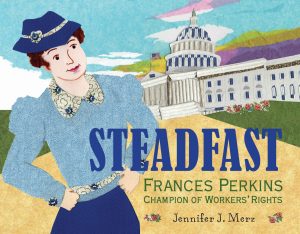
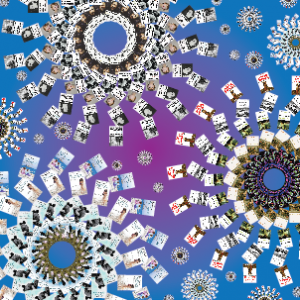
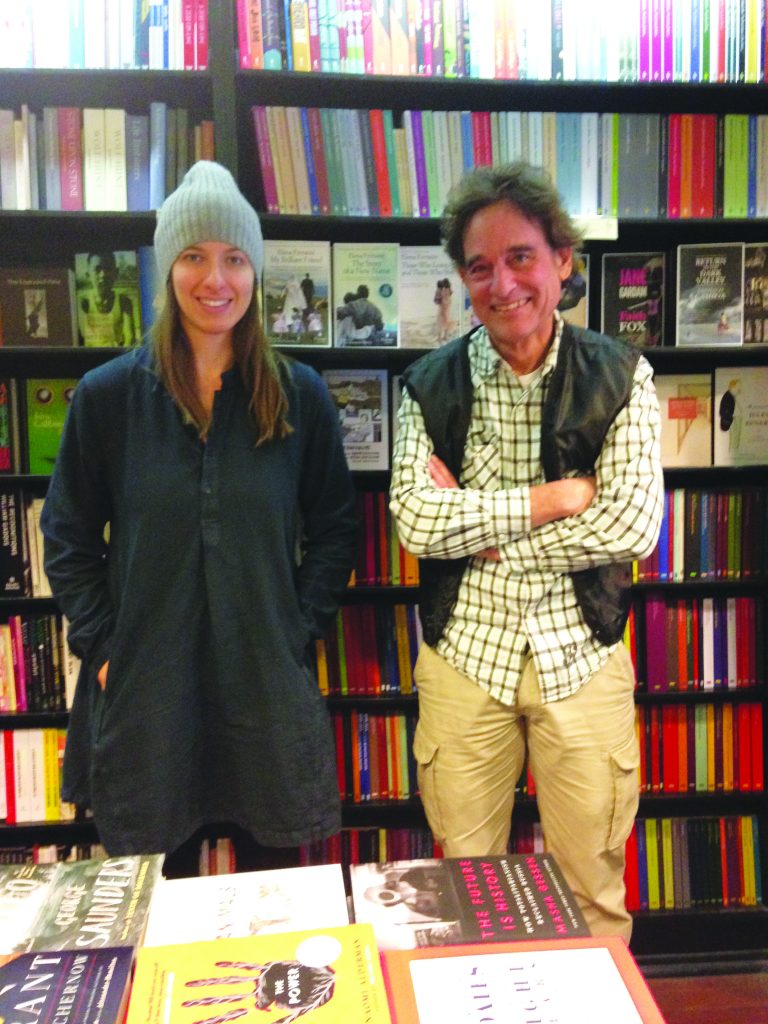
 “You’re really catching us on quite a day,” said Stephanie Valdez when I met up with her and Community Bookstore co-owner Ezra Goldstein one afternoon early in December. Not only was the usual holiday rush upon them, there were last-minute children’s book fairs to coordinate (“it’s almost like setting up two more stores”), book orders to be completed without delay, and sniffles to be suppressed as best one could. (All sneezes have been omitted from the following conversation.) Yet the staff was in good cheer. When I arrived, Ezra was standing by the front register regaling several employees and a customer with a story. Stephanie laughed as she typed busily at the computer, while store mascot Tiny the Cat lounged with characteristic disinterest inside his basket in a corner of the window.
“You’re really catching us on quite a day,” said Stephanie Valdez when I met up with her and Community Bookstore co-owner Ezra Goldstein one afternoon early in December. Not only was the usual holiday rush upon them, there were last-minute children’s book fairs to coordinate (“it’s almost like setting up two more stores”), book orders to be completed without delay, and sniffles to be suppressed as best one could. (All sneezes have been omitted from the following conversation.) Yet the staff was in good cheer. When I arrived, Ezra was standing by the front register regaling several employees and a customer with a story. Stephanie laughed as she typed busily at the computer, while store mascot Tiny the Cat lounged with characteristic disinterest inside his basket in a corner of the window.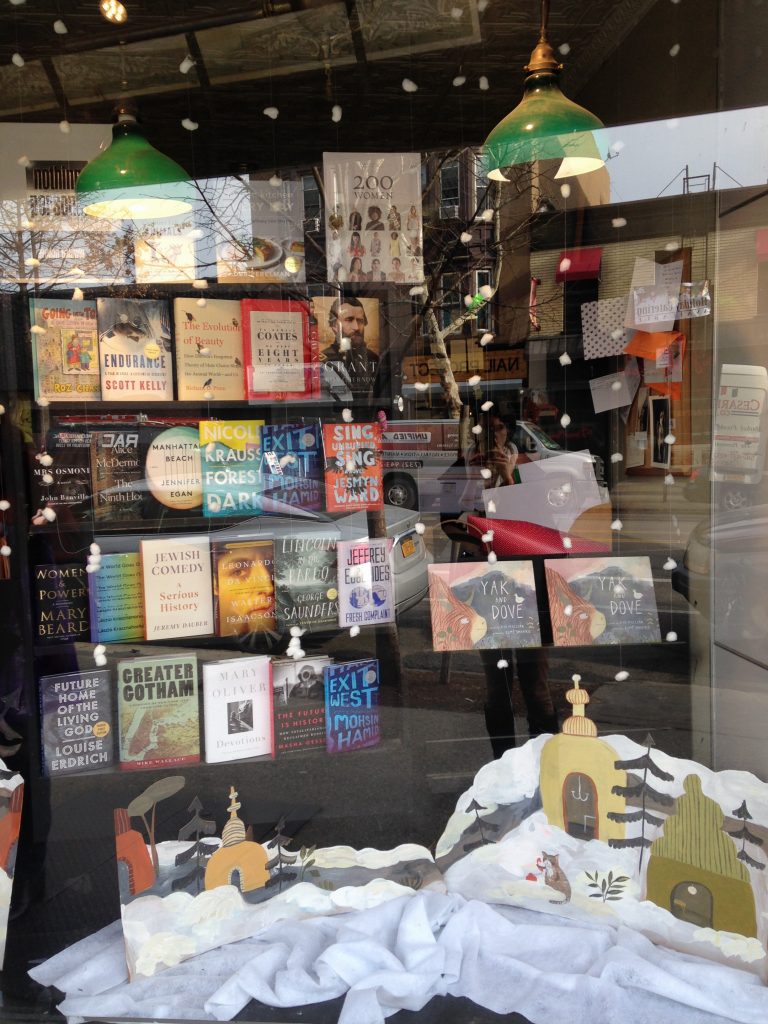
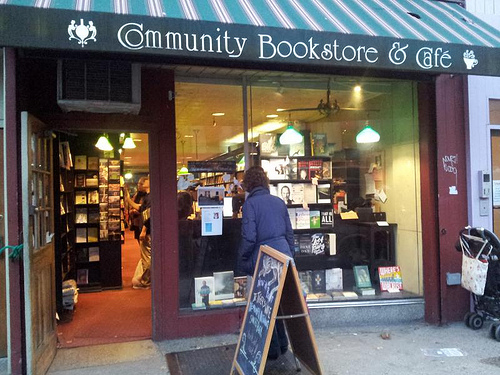
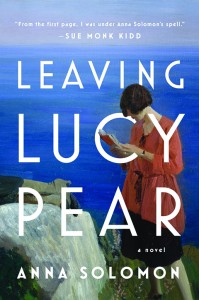 Leaving Lucy Pear by Anna Solomon
Leaving Lucy Pear by Anna Solomon 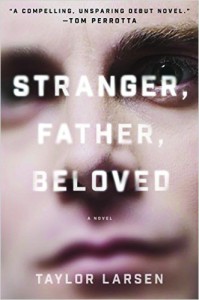 Stranger, Father, Beloved by Taylor Larsen
Stranger, Father, Beloved by Taylor Larsen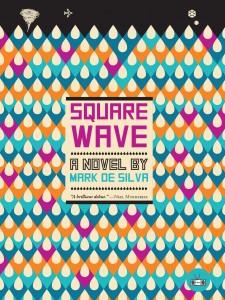
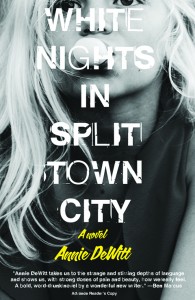 White Nights in Split Town City by Annie de Witt
White Nights in Split Town City by Annie de Witt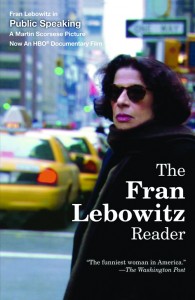 The Fran Lebowitz Reader
The Fran Lebowitz Reader